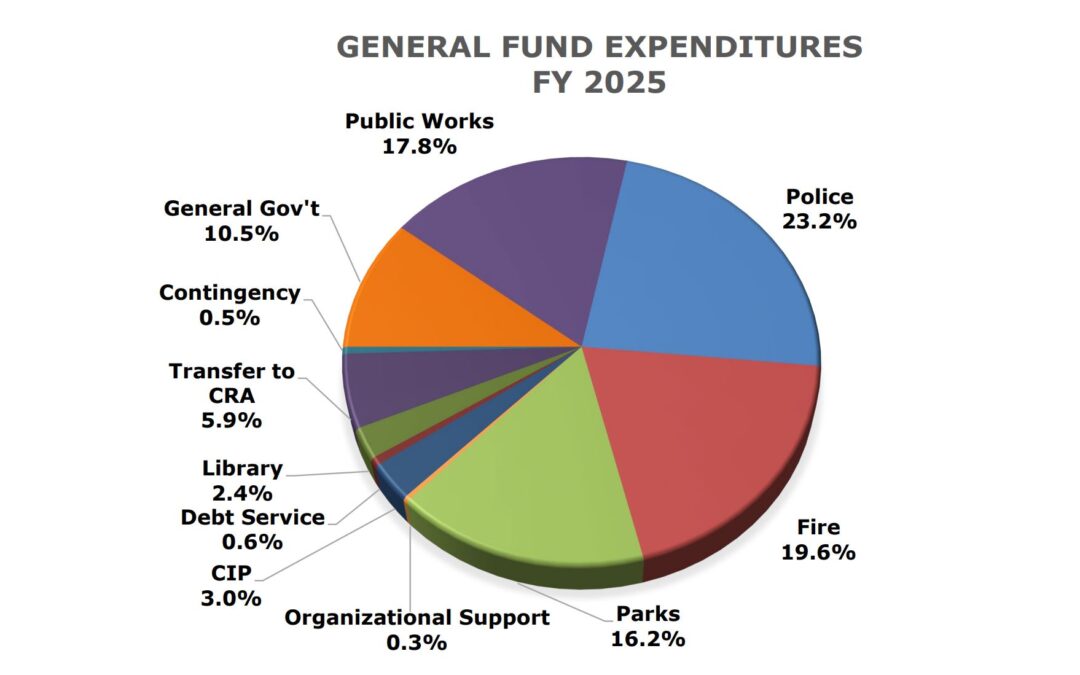
by Beth Kassab | Sep 13, 2024 | City Commission, News, Taxes, Uncategorized
Winter Park approves new $214.6 million budget for 2025
The budget includes more dollars for infrastructure projects, public safety positions and local nonprofit organizations
September 13, 2024
By Beth Kassab
Winter Park’s city budget will grow to $214.6 million for 2025, a 3% increase from the current year driven by an increase in property tax revenue, higher fees paid by residents for stormwater projects and garbage collection along with sales tax revenue passed along by the state.
The City Commission voted 4-0 to approve the budget this week (Commissioner Marty Sullivan was absent from the meeting). Final approval of the spending plan is scheduled for Sept. 25.
The extra $6 million in the new budget will largely go to pay for new positions in the police and fire departments as well as public works projects for roads and other infrastructure.
Commissioners kept the city’s tax rate the same at 4.3302 mils, but higher home values drove property tax collections up by more than 8%.
Residents will also feel the impact from rising fees built into their water, sewer and garbage collection bills as well as the stormwater fee, which is collected as part of the annual property tax bill.
The higher fees account for an additional $3 million in the budget. The average customer will pay about $13 more per month or an extra $156 per year as a result of the rising rates, according to city budget documents.
Garbage collections skyrocketed as part of a new contract with Waste Management, the private contractor for the city.
The stormwater fees are rising as part of a three-year plan to raise rates to about 9 cents per square foot of what the city calls impervious surface (generally the amount of concrete covering a lot). The goal is to raise $2.7 million each year for flood prevention and to improve lake quality.
Commissioners will hold a work session later this month to discuss findings from a series of basin studies that are expected to identify stormwater improvements needed to manage flooding. The studies were ordered last year and are expected to be finalized in October, a city spokeswoman said.
Commissioners also approved an increase in the dollars they give to local nonprofit organizations.
For the first time in 10-years, the city will not provide $100,000 to the Dr. Phillips Center for the Performing Arts after it’s funding agreement ended. Those dollars along with an increase in total support from $2.3 million this year to $2.4 million mean two new groups will receive funding along with increases for the nonprofits already funded by the city.
Organizations receiving support include:
- Mead Botanical Gardens: $98,000, a $4,500 increase.
- Winter Park Historical Association: $93,000, a $5,000 increase.
- Winter Park Day Nursery: $41,000, a $2,500 increase.
- United Arts: $19,000, a $600 increase.
- Blue Bamboo: $12,000, a $1,000 increase.
- Polasek Museum: $27,000, a $1,700 increase.
- Winter Park Library: $2,028,600, a $96,600 increase
- Winter Park Institute: $25,000, newly added this year.
- Men of Integrity: $18,000, newly added this year.
The city’s Community Redevelopment Agency, which is up for an extension and expansion from the Orange County Commission, will provide the following additional aid:
- Enzian Theater: $10,000, no change.
- Heritage Center: $50,000, no change.
- Welbourne Day Nursery: $41,000, a $2,500 increase.
- Winter Park Playhouse: $47,000, a $3,000 increase.
- Depugh Nursing Home: $23,000, a $1,000 increase.
- Winter Park Library: $368,000, an $18,000 increase.
The city’s reserve fund is expected to reach $21.2 million or about 27% of recurring annual operating costs in the General Fund, according to the city budget proposal. The percentage is decreasing because new expenditures are outpacing growth in revenue, according to the document.
Highlights of expenditures include:
•Spending on capital projects will remain stable at $25.6 million, mostly for undergrounding power lines and investments in stormwater.
• Four new public safety positions including two more firefighters/EMTs, a fire logistics manager and a full-time police grant and accreditation manager.
WinterParkVoiceEditor@gmail.com
To comment or read comments from others, click here →
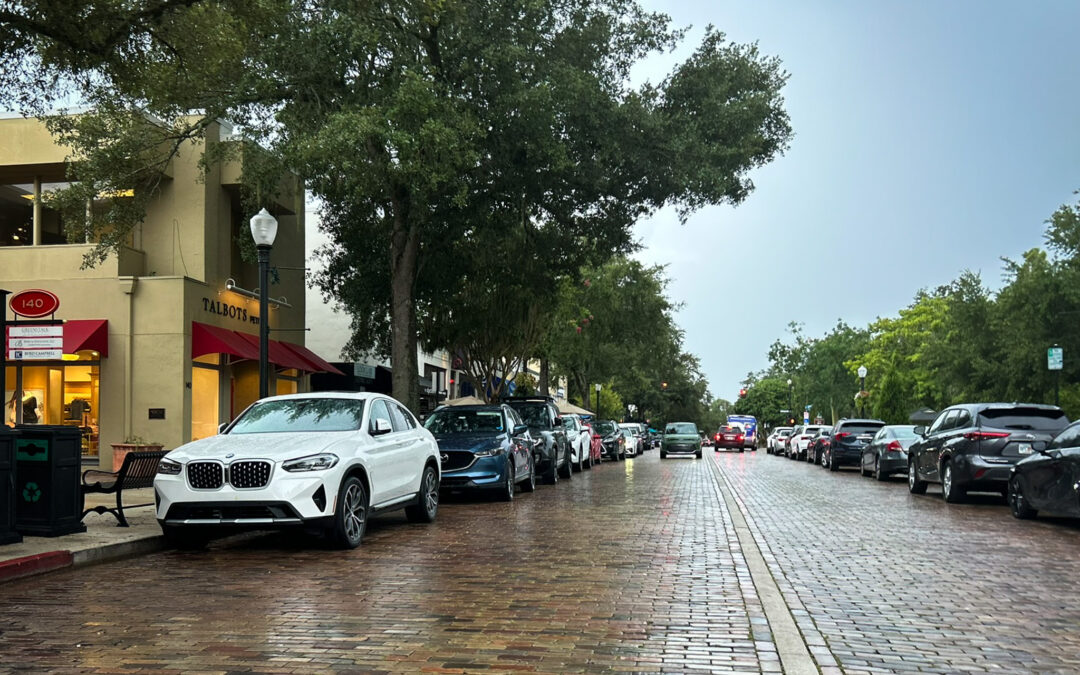
by Beth Kassab | Sep 3, 2024 | City Commission, News, Uncategorized, Zoning and Development
Developers could catch a break on parking rules if changes approved
The P&Z board will tonight hold the first hearing on changes designed to avoid large, mostly empty lots
Sept. 3, 2024
By Beth Kassab
Developers could soon face less strict parking requirements in Winter Park if recommended changes are approved to reduce the number of spaces required for shops, offices and apartments.
The Planning & Zoning Board will hear the proposal for the first time on Tuesday night at 6 p.m.
Last year the Winter Park Chamber of Commerce brought in the author of “Paved Paradise: How Parking Explains the World” to advocate for loosening the number of required spaces for new development.
Henry Grabar argues that all over America, cities are underhoused and overparked. Valuable real estate is taken up by too many unused parking spaces. And that, he says, drives up the cost of construction and pushes sprawl.
Onerous parking codes also offer a way for residents to oppose new affordable or denser housing projects.
“Badmouthing the poor was a little unseemly,” he wrote. “But complaining about parking was morally unimpeachable.”
In fact, parking became a focus in the recent debate over Rollins’ proposal to build 30 units that it plans to rent below market rate to its faculty and staff. The City Commission approved the project last week, ultimately, with a compromised parking arrangement and a pledge from Rollins to give over some land for more on-street parking.
The parking standards used in that project are aligned with the proposed changes from city staff.
Among the proposed changes outlined in the memorandum:
- Unify the parking code requirement for non-medical office and retail city-wide to one space per 333 square feet versus the current rule of one space per 250 square feet. According to the staff report, the standard is already one space for 333 square feet in the Central Business District, the Hannibal Square neighborhood and the Orange Avenue Overlay. This is a 25% decrease in parking required for retail or non-medical office.
- Reduce parking at large office buildings, which have the largest parking surpluses, according to the report. Combined with the change above this would further reduce the parking requirements to one space per 400 square feet for any building larger than 15,000 square feet. “For example, a 30,000 square foot office building now needs 120 parking spaces,” the staff report explained. “With the two changes together (1 per 333 for the first 15,000 square feet and 1 per 400 for next 15,000 square feet), the parking required is 83 spaces. This is a 30% reduction in required parking.”
- For apartments of three or more units, the standards would be 1.25 spaces for a one-bedroom unit; 2 spaces for a two-bedroom unit and 2.5 spaces for a three-bedroom unit. This is the same standard that exists now for properties within the Orange Avenue Overlay. For townhouse and condo projects with larger units, the current rule would remain of 2.5 spaces if the unit is larger than 2,000 square feet.
- The maximum parking provision could be no more than 150% of the code requirement.
During the discussion about the Rollins faculty apartments, some commissioners indicated they may not be on board with the changes.
Commissioner Todd Weaver, who voted against the project, said he would “never vote for decreasing parking in our downtown because there’s no mass transit.”
That has been a key criticism of Grabar’s philosophy — that not every city has the local buses, shuttles or other options in place to wean residents off of their dependence on cars.
Winter Park boasts one of the most successful SunRail stops on the commuter rail’s line, but rail system along with the Lynx bus system lack a regional dedicated funding source to keep up with demand.
The city staff report, however, argues there are reasons unrelated to the transportation debate to reduce parking requirements, especially among office buildings.
“Office floor plans have evolved over the years with larger offices, fewer open-air cubicles and more amenity space,” the report said. “Additionally, the nature of most office businesses has changed so that fewer clients need to visit with the use of email and electronic communication. It also is prudent to have a unified city-wide parking rate for office and retail versus different geographic parking rates, thus the proposal for one per 333 square feet city-wide.”
WinterParkVoiceEditor@gmail.com
To comment or read comments from others, click here →

by Beth Kassab | Aug 29, 2024 | Election, News, Uncategorized, Zoning and Development
Steve Leary taps political committee for unlimited dollars in race against Kelly Semrad
Universal Orlando, Tavistock, other land developers wrote big checks in support of the former Winter Park mayor who is facing Semrad in the November election
Aug. 29, 2024
By Beth Kassab
Steve Leary, candidate for Orange County Commission District 5, started a political committee earlier this summer that has allowed him to take uncapped donations from deep-pocketed businesses who often have business in front of the commission such as tourism giant Universal Orlando and Tavistock Development Company.
The committee called Neighbors for a Sensible Orange County brought in $48,000 in July and August, according to the most recent financial filings, and has most of the money left to spend ahead of the general election on Nov. 5 when Leary, a Republican and former Winter Park mayor, faces Kelly Semrad, a Democrat and UCF professor who took first place in the primary on Aug. 20. The races are technically non-partisan but the parties are frequently involved in the campaigns.
Universal Orlando is the largest contributor so far at $7,500 followed by $6,000 from companies associated with John Miklos, the former chairman of the St. Johns River Water Management District who also operates an environmental consulting business.
Leary’s campaign did not respond to questions from the Voice about the committee’s contributions or expenses or how, if at all, the financial contributions would affect his actions if elected to the county commission.
The Rosen Centre Hotel and the law firm Fishback Dominick, which includes Winter Park City Attorney Kurt Ardaman, each gave the committee $5,000. Orlando Mayor Buddy Dyer’s political committee called Orlando PAC gave $4,000. A company called Windermere Property Holdings, which is managed by Tavistock Development Company’s general counsel and senior vice president, gave $2,500.
Another $2,500 came from a company called CHCG Land Services, which shares an address with Lake Pickett North, an entity behind Sustanee, the 1,800-home project proposed in the rural area between Lake Pickett Road and UCF that was rejected by the County Commission earlier this year. This month Lake Pickett North filed a lawsuit against Orange County seeking to stop a vote in November on ballot questions that ask voters to establish a rural boundary and give the county commission veto power over voluntary annexations into a city.
Some donors such as Universal and Rosen have also contributed directly to Leary’s campaign, which has raised about $200,000 compared to about $60,000 raised by Semrad, who is championing causes that conflict with some business interests of developers and the tourism industry.
Semrad, who is endorsed by environmental groups and is a vocal advocate for protecting the county’s rural boundary and giving the county commission more power over annexations such as those that have come up this year by Tavistock and the Church of Jesus Christ of Latter-day Saints, which recently applied to move some 50,000 acres of its Deseret Ranch land in southeast Orange into the city of Orlando.

Results from the Aug. 20 primary show a 9 point lead for Kelly Semrad. She is facing Steve Leary in the Nov. 5 runoff.
Semrad, who teaches about tourism economies, is also pushing to use a portion of the county’s Tourist Development Tax on basic services and quality-of-life projects for residents such as mass transit. Today the levy on hotel beds is directed almost entirely to marketing the tourism industry, the Orange County Convention Center and other industry-backed projects.
Political Action Committees are commonplace in Tallahassee and among statewide races, and appear to be gaining ground in local campaigns, too. They are a popular fundraising tool because donors are not limited to the $1,000 maximum that exists on direct campaign contributions and committees have wide latitude in how they can spend their money.
Austin Arthur, a candidate in District 1, and Linda Stewart, a candidate in District 3, also appear to have committees working to promote them or attack their opponents.
Leary opened the committee in late May and named himself as the chairman. The expenses so far include political consulting fees, $500 to the Orange County Republican Executive Committee and $1,476 labeled as text messages to voters, according to the financial reports.
Leary’s campaign did not respond to a question about what kind of text messages were sent. A firm called Victory Research Group was paid for the texts. Victory is managed by Robbie Vogan, according to state corporate records.
Vogan is a colleague of Rachael Kobb, who is helping to run Leary’s campaign, at Central Florida Public Affairs, the lobbying firm founded by Sharon Smoley.
Kobb is a registered Orange County lobbyist and managed the re-election campaign for Dyer, one of the region’s most well-known Democrats who used his own political committee this summer to endorse Leary as the only Republican amid a slate of Democrats in local races. Dyer is also a vocal opponent of the limits the county commission is asking voters to set on voluntary annexations, which would make it harder to grow his city’s boundaries.
Kelly Cohen, a lobbyist with high-profile clients who has been closely aligned with Dyer since his first mayoral campaign more than 20 years ago, told the Voice she is supporting Leary but does not not have a paid role on the campaign. Cohen represents Tavistock, Walt Disney Parks & Resorts, Orlando Regional Realtor Association and more as a lobbyist in front of the County Commission, according to the county lobbying directory.
WinterParkVoiceEditor@gmail.com
To comment or read comments from others, click here →
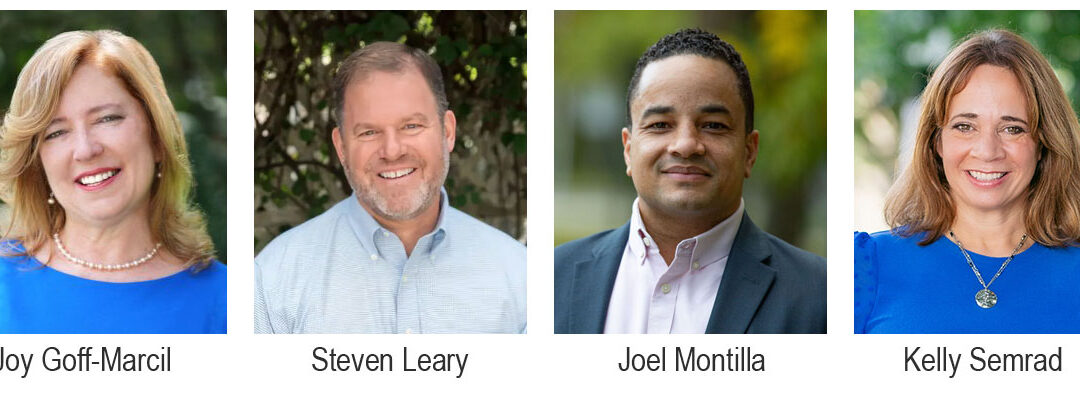
by Beth Kassab | Aug 26, 2024 | Election, News, Uncategorized, Zoning and Development
Steve Leary, with Buddy Dyer's endorsement, heads to run-off from second place
The Orlando mayor and Democrat lent his political sway to the Republican former Winter Park mayor who is running in a heavily blue Orange County Commission district. But Kelly Semrad, a UCF professor and Democrat, emerged from the primary in first place
Aug. 26, 2024
By Beth Kassab
Steve Leary, the former Winter Park mayor and Republican who outraised his opponents in the District 5 Orange County Commission race by more than 3 to 1 and touted the endorsement of one of the region’s most powerful Democrats in Orlando Mayor Buddy Dyer, is now heading into the Nov. 5 run-off from a distant second place.
Leary finished the Aug. 20 primary with 32% of the vote, 2,800 votes and 9 percentage points behind Kelly Semrad (41%), a Democrat and UCF professor who centered her campaign on how to protect rural lands from development and calls to spend the lucrative Tourist Development Tax on services and quality-of-life projects for residents vs. expenses backed by the tourism industry.
The gulf between Leary’s fundraising haul — nearly $200,000 — and Semrad’s $60,000 is stark. And political action committees such as Dyer’s Orlando PAC and the Realtor’s spent even more on Leary’s behalf.
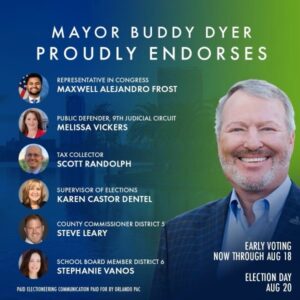
A campaign ad paid for by Orlando PAC shows Orlando Mayor Buddy Dyer’s endorsements.
A mailer just before the primary from Dyer’s PAC showcased Leary amid a slate of Democrats endorsed by the popular Orlando mayor who was first elected more than 20 years ago. The card also named U.S. Rep. Maxwell Frost, Public defender candidate Melissa Vickers, Tax Collector Scott Randolph, Supervisor of Elections candidate Karen Castor Dentel and School Board candidate Stephanie Vanos.
A separate mass text message to voters from Dyer said the people on his list “lead with integrity and are committed to fighting for Orange County residents’ quality of life.”
Leary, who received campaign contributions from a number of development and tourism interests, was the only candidate on that line-up also touted by the local Republican Party and the only one who did not emerge in first place after last week’s election (except for Castor Dentel after the supervisor’s contest was pushed to November because of a court challenge).
Semrad won 35 of the 50 precincts in the district that runs from downtown Orlando through Winter Park and Maitland to Bithlo and Christmas at the eastern edges of the county’s border. One precinct showed an exact tie.
Of the 14 precincts won by Leary, which were centered in Maitland and Winter Park, he won seven by 10 or fewer votes.
The district has more than 145,000 voters with about 55,000 Democrats, 45,000 Republicans and 45,000 people who are registered without a party affiliation or major party.
Joy Goff-Marcil (who won 16% of the vote), also a Democrat, and Joel Antonio Montilla (who won 12%), also a Republican, were eliminated from the contest to fill the seat left open by Commissioner Emily Bonilla, who has reached term limits.
“We knocked on 17,134 doors,” Semrad, 47, said. “Our goal was the Top 2. We were surprised to finish so far out front as we were out funded on the books and we were way out funded in PAC [Political Action Committee] contributions.”
Samuel Vilchez Santiago, the chairman of Orange County Democratic Executive Committee, said his group sent out texts and mailers alerting voters that Leary is a Republican, not a Democrat. He said the messages were not in response to Dyer’s endorsement, but to educate voters.
“The election last Tuesday showed that money cannot buy people’s votes,” Santiago said, pointing also to the District 1 Commission race, where Nicole Wilson, a Democrat, was far outraised by Republican Austin Arthur. They are also heading into a runoff after primary results showed she led by just two votes.
Leary, 57, whose campaign said he was unavailable to be interviewed for this story, announced Dyer’s endorsement in a June news release.
“I have had the pleasure of collaborating with Steve Leary for over 10 years during his tenure as Winter Park Mayor and Commissioner,” Dyer said in the release. “He is bright, thoughtful, and an effective leader. His experience, vision, and collaborative approach will greatly benefit all residents of District 5. I proudly endorse and fully support him.”
The endorsement also comes at a critical time for Orlando’s growth plans.
On Monday, the Orlando Sentinel reported that the Church of Jesus Christ of Latter-day Saints is attempting to annex into Orlando more than 52,000 acres of mostly untouched land in southeast Orange County, where development and environmental regulations are considered more restrictive on developers.
Earlier this year, Orlando annexed some 12,000 acres of unincorporated southeast Orange County designated for a new housing development known as Sunbridge and owned by Tavistock. The real estate and investment company is known for its billionaire founder Joe Lewis and is the same company that developed Lake Nona, owns Isleworth Golf and Country Club in Windermere and other high-profile investments across the globe.
Tavistock and companies affiliated with the church that operate its vast Deseret Ranch land have worked together to advocate for a controversial road through Split Oak Forest. The road would serve as a connector between the new developments and Osceola County.
The annexations have triggered a power struggle between Orlando and Orange County over the future of giant swaths of land and environmentalists have cried foul over what they see as the negative consequences of sprawl.
Orange County Mayor Jerry Demings’ commission this summer added two questions to the November ballot that, if approved by voters, would protect Orange’s rural boundary as well as give the county veto power over such annexations.
Dyer and other local mayors signed a letter to Demings opposing the annexation question, saying it violates “home rule” for cities. Winter Park Mayor Sheila DeCiccio did not sign the letter.
Dyer’s spokeswoman said she would need to speak to him directly about why he endorsed Leary and whether the decision is related to the annexation issue. She did not respond to a follow-up question.
Semrad is one of the most vocal advocates for strengthening the county’s control over annexations and the rural boundary, even initiating the ballot questions last year — though the Legislature intervened and only the County Commission had authority to put the questions on the ballot for approval.
Leary has stated he supports the question about the rural boundary.
But Semrad said the rural boundary question itself doesn’t have any teeth. The second question on the annexation veto power is what would give the county the power to ensure environmental and development regulations are followed.
“Annexing into the city has been a loophole to make quick cash, contribute to sprawl and pay less for environmental devastation,” she said.
Leary’s campaign website touts endorsements from Republicans such as former Congressman John Mica and former Florida House Speaker Dean Cannon as well as Edgewood Mayor and campaign consultant John Dowless. Other Democrats have also lent their support, such as Craig Russell, elected earlier this year as the first Black commissioner in Winter Park in more than 100 years, and Gary and Victoria Siplin, who served in the state Senate and Orange County Commission, respectively.
Semrad boasts endorsements from Frost, Randolph, Bonilla, state Rep. Anna Eskamani and incoming state Sen. Carlos Guillermo Smith among others.
WinterParkVoiceEditor@gmail.com
To comment or read comments from others, click here →
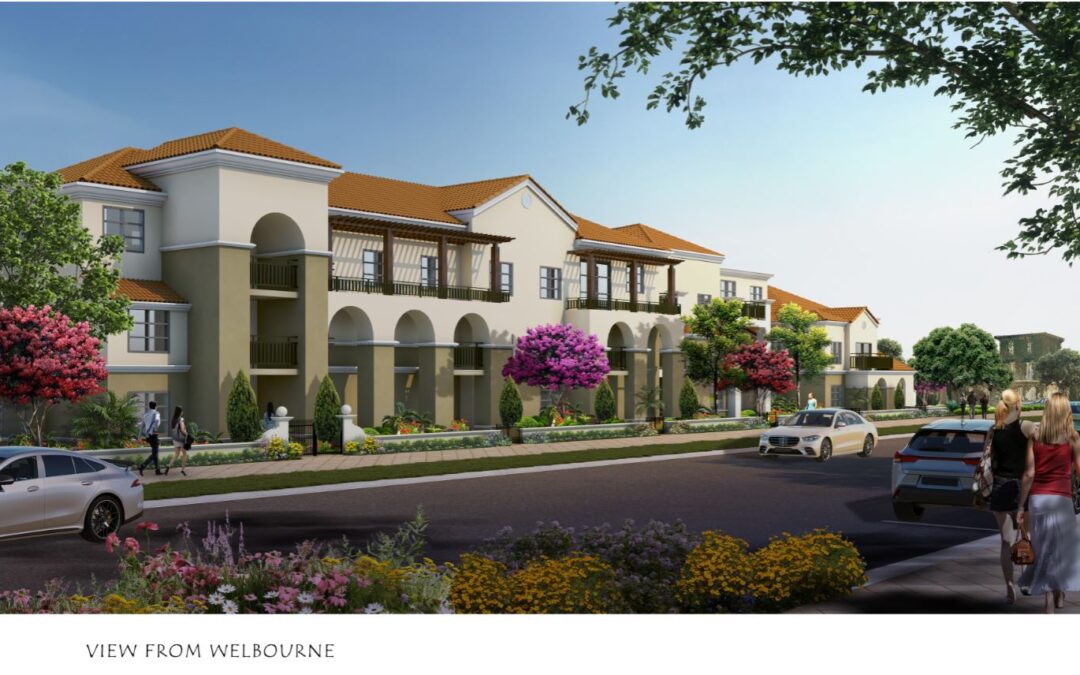
by Beth Kassab | Aug 23, 2024 | City Commission, News, Uncategorized, Zoning and Development
Rollins proposes payment equivalent to some taxes on faculty apartments
The liberal arts college is often exempt from property taxes as a nonprofit educational institution. The agreement now before the City Commission would be a first for the city.
Aug. 23, 2024
By Beth Kassab
In a first-of-a-kind deal for Winter Park, Rollins College is proposing it pay a fee equal to a portion of the city property taxes it would owe on a faculty housing project up for City Commission approval next week.
The potential agreement comes after months of back-and-forth with city officials and residents over the liberal arts college first unveiled plans to build 48 apartments on land it already owns at Welbourne and Virginia avenues.
College administrators say the apartments, which would be rented to faculty and staff below market rate, will serve as a recruiting tool for early-career professors who would otherwise likely live much farther from campus as a result of the high cost of rent in Winter Park, where homes routinely sell for more than $1 million.
But criticism over the architecture of the project, lack of commercial space on a portion that once fronted New England Avenue, parking concerns and the college’s typical exemption from property taxes contributed to major revisions of the plans.
The project now contains 30 units vs. 48, a pocket park, additional parking and no longer includes a building fronting New England Avenue.
In what appears to be an effort to satisfy calls from the Planning & Zoning Board to contribute to funds for city services, the college says it will enter into a Payment in Lieu of Taxes or PILOT agreement with Winter Park if the typical exemption for nonprofit educational institutions is granted on the land.
The payment would equal about 50% of the taxes owed to the city or about 2 mills. Rollins estimated the payment at between $18,000 to $20,000 a year, though an exact figure won’t be available until it is built and assessessed by the Orange County Property Appraiser.
“The PILOT payment is intended to offset the costs of emergency services for the multi-unit residential project,” the college said in the language it submitted to the city.
“Currently, we have 14 units on the site, and we pay no taxes,” said college spokeswoman Jo Marie Hebeler. “So this is a significant commitment and contribution from Rollins.”
Rollins uses an older building on the site for graduate student housing, but that would be torn down as part of the new project.
The private college, known for its lakefront Spanish-Mediterranean campus and tuition and fees totaling more than $76,000 a year, had resisted such an agreement in previous meeting, citing what it said was already significant contributions toward city services such as allowing the police and fire departments to use old buildings for training and argued such a deal would set a bad precedent.
Much of Rollins’ property holdings in the city are exempt from the tax rolls and some residents have voiced concerns that the college is growing too far outside of its main campus and should contribute more toward the cost of development.
The college does pay taxes on some of its land that doesn’t qualify as exempt such as on The Alfond Inn, a luxury hotel it runs as a for-profit business. The college owes $767,000 in taxes this year on the inn, which is assessed at nearly $50 million, according to property appraiser records.
Jeff Briggs, the city’s longtime planning director, said this is the first time a nonprofit group has reached a PILOT agreement with the city. The deal will likely be closely watched by other nonprofits across the region including hospitals such as AdventHealth and Orlando Health and other colleges and universities.
The City Commission will take up the project at its meeting on Wednesday, Aug. 28.
WinterParkVoiceEditor@gmail.com
To comment or read comments from others, click here →
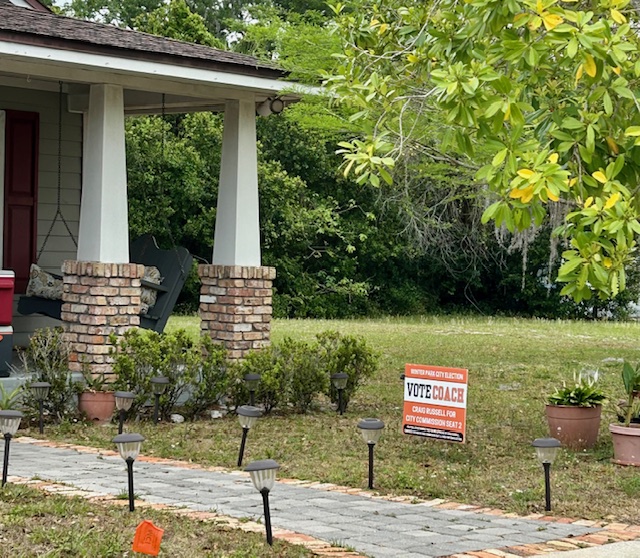
by Beth Kassab | Aug 17, 2024 | Election, News
How to recycle your campaign yard signs
After the Tuesday primary you can do your part to keep plastic signs out of the landfill
Aug. 17, 2024
By Beth Kassab
Winter Park officials are encouraging residents to recycle yard signs after Tuesday’s primary election.
The city, which typically ranks among the highest voter turnout in the region, is a hotbed for campaigning and signs spring up like hydrilla on the chain of lakes shoreline.
After the 2022 election season, the city recycled thousands of signs in partnership with Orlando, Orange County and the League of Women Voters, sparing the landfill from nearly 6 tons of additional bulk, according to a Winter Park news release.
The recycling effort transports the waste to NuCycle Energy, which converts the signs to cubes that can be used to generate energy.
“This recycling initiative will prevent an abundance of yard signs from going to a local landfill,” the release stated. “Most political signs are made from No. 5 plastic (polypropylene), a common plastic found in hundreds of household and commercial products, such as a yogurt container.”
To recycle your signs, drop them off between Wednesday, Aug. 21 at noon and Sunday, Sept. 1 at noon at one of the following locations:
• Cady Way Pool at 2529 Cady Way
• Mead Botanical Garden Community Garden at 1310 S. Denning Drive
• Fire Station 64 at 1439 Howell Branch Road
• For additional locations access cityofwinterpark.org/waste
WinterParkVoiceEditor@gmail.com
To comment or read comments from others, click here →









Recent Comments